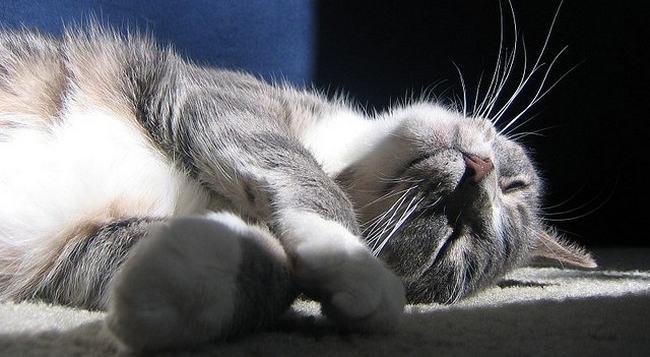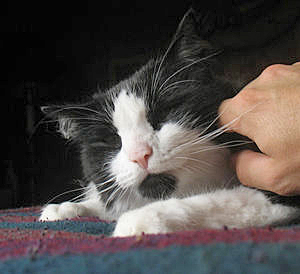
We all know that the soft humming sound that cats make while relaxing in our laps indicates a feeling of contentment and satisfaction. This action, in turn, gives cat owners a feeling of calmness and peace. Purring seems to be more than just a sound cats make. It involves their whole body and is an interesting phenomenon indeed. What is the explanation for this curious bodily function though? Why do cats purr?
The primal reason for this characteristic sound is said to have been for communication between a mother cat and her litter. A kitten is capable of producing a “purr” from about the second day after being born into the world. It is not possible to let out a vocal “Meow” while nursing but kittens can easily purr and feed at the same time and mother cats will regularly purr back at their offspring in order to sooth and make them feel comfortable.
In order to understand the question, "why do cats purr?", it is necessary to take a brief look at the physiology behind a purr. What goes on inside a cats body when they begin this contented sound? Studies have shown that certain nerves are used in the voice box of cats to generate the purring sound. These nerves cause vibrations along the throat as the cat’s diaphragm pushes air out and in. This creates the “hum” that is audible when a cat is purring, and this seems to be a voluntary action so your cat is in total control of their ability to produce this sound.
A recent contrasting explanation for purring is that it is an action caused by brain chemistry within a cat. As the feline’s body releases endorphins it triggers the purring response. Endorphins are released in several emotional situations including pleasure, contentment, pain, and anxiety. This theory would seem to indicate that cats do not only purr when they are “happy”.
Cats, most commonly, use purring as a means of communicating emotion. Even some wild cats have been known to make this same sound. As a cat grows older the exact meaning behind their purring can change slightly. Most cats make this sound to show happiness or pleasure, but this vocalization has also been observed in severely ill felines or ones who are overly frightened. Pregnant cats tend to purr while having their babies and cats close to death purr as well. These instances seem to indicate that purring can be a means of dealing with anxiety as well as calm and comfortable feelings.
So purring could definitely be a way that cats reassure themselves in a stressful situation. Humans have been known to sing to themselves or hum when put in a similarly anxious situation. If a cat is scared, a purr might be used to communicate that they have no intention of making aggressive actions. A wild cat may use purring as a means to signal to other cats that they are not a threat. Regardless of the exact meaning, it becomes clear that purring is a multi-function action.
 | So why do cats purr? There is not a specific reason really. They can purr to show several emotions. Most commonly it is simply a way for them to express happiness and comfort. It helps them relax and it helps their owners to feel a little contentment as well, knowing that everything is right in their precious kitty’s little world. |
| Russ Barker has had his share of lap cats and knows how comforting a purring feline can be. He also has found himself asking the question "Why Do Cats Purr?" Russ is a blogger for DogTagArt.com, a site created to help educate pet owners about the crucial action of making sure all their pets have up-to-date pet ID tags. In order to spread the word, they have created hundreds of fun and unique custom dog tags which allow pet owners to show their creativity while putting the standard boring metal ID tags to shame. |  |

